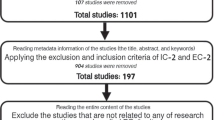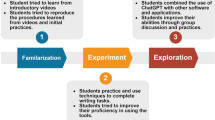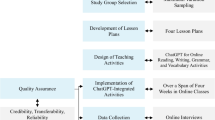Abstract
Technology integration in second language acquisition (SLA) has become prevalent and prominent in the modern age. Quizlet has emerged as a vocabulary learning tool integrated not only into computers (CALL) but also into mobile phones (MALL), over the years; its effectiveness has already been proved via several quasi-experimental studies. However, such research is still limited; some did not even include a control group. Further, whether learners’ individual differences may have any impact on Quizlet effectiveness in promoting lexical gains remains unknown. To address these gaps, this study was conducted with the participation of 68 Vietnamese undergraduates, following a pretest-posttest design together with semi-structured interviews. While the control group (N = 35) reviewed lexical items in a conventional way, the experimental group (N = 33) used Quizlet for vocabulary revision. Prior to the five-week treatment, all participants took the pretest, receptive and productive vocabulary knowledge tests, and three working memory tests. When all revision sessions were completed, all participants took the posttest. Then, five random learners in the experimental group were invited to join the semi-structured interviews. Results showed that while revision on Quizlet led to greater lexical gains, working memory and prior vocabulary knowledge did not play any significant role in predicting such improvements. Pedagogical implications for teachers and recommendations for future research were also provided to address vocabulary retention, individual differences, and the use of Quizlet more effectively.





Similar content being viewed by others
Data Availability
All the data used in this study belong to the authors and will be shared upon reasonable request.
Abbreviations
- CALL:
-
Computer-assisted language learning
- CEFR:
-
Common European Framework of Reference for Languages
- EFL:
-
English as Foreign Language
- ESL:
-
English as Second Language
- GLMM:
-
Generalized Linear Mixed Model
- L2:
-
Second language
- L1:
-
First language
- MALL:
-
Mobile-assisted language learning
- SLA:
-
Second language acquisition
- SPSS:
-
Statistical Packages for Social Sciences
- VIF:
-
Variance Inflation Factor
References
About Quizlet (2022). Quizlet. Retrieved August 20, 2022, from https://quizlet.com/mission
Arnold, K. M., & McDermott, K. B. (2013). Test-potentiated learning: distinguishing between direct and indirect effects of tests. Journal of Experimental Psychology: Learning Memory and Cognition, 39(3), 940.
Ascher, A., & Saslow, J. (2022). (n.d.). Top Notch | Online Placement Test—All Levels (24 months). Pearson ERPI. Retrieved September 1, from https://www.pearsonerpi.com/en/elt/integrated-skills/top-notch-online-placement-test-all-levels-24-months-9780132470308
Ataş, U. (2018). The Role of Receptive Vocabulary Knowledge in Advanced EFL Listening Comprehension. TESL-EJ, 21(4).
Baddeley, A. (2003). Working memory: looking back and looking forward. Nature Reviews Neuroscience, 4(10), 829–839.
Barianos, A. K., Papadakis, A., & Vidakis, N. (2022). Content manager for serious games: theoretical framework and digital platform. Advances in Mobile Learning Educational Research, 2(1), 251–262.
Bates, D., Mächler, M., Bolker, B., & Walker, S. (2014). Fitting linear mixed-effects models using lme4. ArXiv Preprint ArXiv:1406.5823.
Bi, X., & Shi, X. (2019). On the Effects of Computer-Assisted Teaching on Learning Results Based on Blended Learning Method.International Journal of Emerging Technologies in Learning, 14(1).
Çeçen, G. (2020). Tertiary level EFL students’ perceptions regarding the use of Edmodo, Quizlet, and Canva within technology acceptance model (Tam) (Doctoral dissertation, Bilkent University).
Creswell, J. W., & Creswell, J. D. (2017). Research design: qualitative, quantitative, and mixed methods approaches. Sage publications.
Dang, T. N. Y., Lu, C., & Webb, S. (2022). Incidental learning of single words and collocations through viewing an academic lecture. Studies in Second Language Acquisition, 44(3), 708–736.
De Neys, W., d’Ydewalle, G., Schaeken, W., & Vos, G. (2002). A dutch, computerized, and group administrable adaptation of the operation span test. Psychologica Belgica, 42(3), 177–190.
Dizon, G. (2016). Quizlet in the EFL classroom: enhancing academic vocabulary acquisition of japanese university students. Teaching English with Technology, 16(2), 40–56.
Dörnyei, Z. (2014). The psychology of the language learner: individual differences in second language acquisition. Routledge.
Dreyer, J. (2014). The Effect of Computer-Based Self-Access Learning on Weekly Vocabulary Test Scores.Studies in Self-Access Learning Journal, 5(3).
Duman, G., Orhon, G., & Gedik, N. (2015). Research trends in mobile assisted language learning from 2000 to 2012. ReCALL, 27(2), 197–216.
Duong, P. T., Perez, M. M., Desmet, P., & Peters, E. (2021a). Learning vocabulary in spoken input-and output-based tasks. TASK, 1(1), 100–126.
Duong, P. T., Perez, M. M., Nguyen, L. Q., Desmet, P., & Peters, E. (2021b). Incidental lexical mining in task repetition: the role of input, input repetition and individual differences. System, 103, 102650.
Eickhoff, L., Frazier, L., & Vosters, M. (2018). University Success, Reading, Advanced. Pearson.
Faraj, A. K. A. (2015). Effective strategies for turning receptive vocabulary into productive vocabulary in EFL Context. Journal of Education and Practice, 6(27), 10–19.
Faul, F., Erdfelder, E., Buchner, A., & Lang, A. G. (2009). Statistical power analyses using G* power 3.1: tests for correlation and regression analyses. Behavior Research Methods, 41(4), 1149–1160.
Feng, Y., & Webb, S. (2020). Learning vocabulary through reading, listening, and viewing: which mode of input is most effective? Studies in Second Language Acquisition, 42(3), 499–523.
Folse, K. S. (2006). The effect of type of written exercise on L2 vocabulary retention. TESOL Quarterly, 40(2), 273–293.
Fox, J., Weisberg, S., Adler, D., Bates, D., Baud-Bovy, G., Ellison, S., Firth, D., Friendly, M., Gorjanc, G., & Graves, S. (2012). Package ‘car.’ Vienna: R Foundation for Statistical Computing, 16.
Hyland, K., & Tse, P. (2007). Is there an “academic vocabulary”? TESOL Quarterly, 41(2), 235–253.
Jin, Z., & Webb, S. (2020). Incidental vocabulary learning through listening to teacher talk. The Modern Language Journal, 104(3), 550–566.
Juffs, A., & Harrington, M. (2011). Aspects of working memory in L2 learning. Language Teaching, 44(2), 137–166. https://doi.org/10.1017/S0261444810000509
Kapp, K. M. (2012). The gamification of learning and instruction: game-based methods and strategies for training and education. John Wiley & Sons.
Kasahara, K., & Kanayama, K. (2021). When to conduct a vocabulary quiz, before the review or after the review? System, 103, 102641.
Korlu, H., & Mede, E. (2018). Autonomy in vocabulary learning of turkish EFL learners. The EUROCALL Review, 26(2), 58–70.
Krashen, S. (1992). The input hypothesis: An update. Linguistics and Language Pedagogy: The State of the Art, 409–431.
Laufer, B., & Hulstijn, J. (2001). Incidental vocabulary acquisition in a second language: the construct of task-induced involvement. Applied Linguistics, 22(1), 1–26.
Laufer, B., & Nation, P. (1999). A vocabulary-size test of controlled productive ability. Language Testing, 16(1), 33–51. https://doi.org/10.1177/026553229901600103
Li, Y., & Hafner, C. A. (2022). Mobile-assisted vocabulary learning: investigating receptive and productive vocabulary knowledge of chinese EFL learners. ReCALL, 34(1), 66–80.
Linck, J. A., & Cunnings, I. (2015). The utility and application of mixed-effects models in second language research. Language Learning, 65(S1), 185–207.
Lu, M. (2008). Effectiveness of vocabulary learning via mobile phone. Journal of Computer Assisted Learning, 24(6), 515–525.
Martínez-Jiménez, R., Pedrosa-Ortega, C., Licerán-Gutiérrez, A., Ruiz-Jiménez, M. C., & García-Martí, E. (2021). Kahoot! As a tool to improve student academic performance in business management subjects. Sustainability, 13(5), 2969.
Nakata, T., & Suzuki, Y. (2019). Effects of massing and spacing on the learning of semantically related and unrelated words. Studies in Second Language Acquisition, 41(2), 287–311.
Nakata, T., & Webb, S. (2016). Does studying vocabulary in smaller sets increase learning?: the effects of part and whole learning on second language vocabulary acquisition. Studies in Second Language Acquisition, 38(3), 523–552.
Nation, I. (2006). How large a vocabulary is needed for reading and listening? Canadian Modern Language Review, 63(1), 59–82.
Nguyen, L. T. C., & Nation, P. (2011). A bilingual vocabulary size test of English for Vietnamese learners. RELC Journal, 42(1), 86–99.
Nguyen, L. Q., & Le, H. V. (2022). Quizlet as a Learning Tool for Enhancing L2 Learners’ Lexical Retention: Should It be Used in Class or at Home?. Human Behavior and Emerging Technologies, 2022, 1–10. https://doi.org/10.1155/2022/8683671
Norris, J. M. (2015). Statistical significance testing in second language research: Basic problems and suggestions for reform. Language Learning, 65(S1), 97–126.
O’brien, I., Segalowitz, N., Collentine, J., & Freed, B. (2006). Phonological memory and lexical, narrative, and grammatical skills in second language oral production by adult learners. Applied Psycholinguistics, 27(3), 377–402.
Paivio, A. (2010). Dual coding theory and the mental lexicon. The Mental Lexicon, 5(2), 205–230.
Papadakis, S., & Kalogiannakis, M. (2019). Evaluating the effectiveness of a game-based learning approach in modifying students’ behavioural outcomes and competence, in an introductory programming course: a case study in Greece. International Journal of Teaching and Case Studies, 10(3), 235–250.
Pawlak, M. (2021). Teaching Foreign Language Grammar to Children: the role of individual differences. In J. Rokita-Jaśkow, & A. Wolanin (Eds.), Facing diversity in child Foreign Language Education (pp. 55–71). Cham: Springer. https://doi.org/10.1007/978-3-030-66022-2_4.
Pellicer-Sánchez, A., & Schmitt, N. (2010). Incidental vocabulary acquisition from an authentic novel: do things fall apart? Reading in a Foreign Language, 22(1), 1.
Perez, M. M. (2020). Incidental vocabulary learning through viewing video: the role of vocabulary knowledge and working memory. Studies in Second Language Acquisition, 42(4), 749–773.
Peters, E. (2019). Factors affecting the learning of single-word items 1. The Routledge handbook of vocabulary studies (pp. 125–142). Routledge.
Phi, T. T. (2016). Application of Quizlet to teaching and learning business English vocabulary at Ho Chi Minh City University of Economics. In Proceedings of The First International Conference on Language Development (ICLD 2016).
R Core Team (2022). R: A language and environment for statistical computing. R Foundation for Statistical Computin, Vienna, Austria. Retrieved August 20, 2022, from https://www.R-project.org
Rivera, E. S., & Garden, C. L. P. (2021). Gamification for student engagement: a framework. Journal of Further and Higher Education, 45(7), 999–1012.
Schmidt, R., & Frota, S. (1986). Developing basic conversational ability in a second language: a case study of an adult learner of portuguese. Talking to Learn: Conversation in Second Language Acquisition, 237, 326.
Swain, M. (1985). Communicative competence: some roles of comprehensible input and comprehensible output in its development. Input in Second Language Acquisition, 15, 165–179.
Turner, M. L., & Engle, R. W. (1989). Is working memory capacity task dependent? Journal of Memory and Language, 28(2), 127–154.
Waluyo, B. (2020). Learning outcomes of a general English course implementing multiple e-learning technologies and active learning concepts. Journal of Asia TEFL, 17(1), 160.
Waluyo, B., & Bucol, J. L. (2021). The impact of gamified vocabulary learning using Quizlet on low-proficiency students. Computer Assisted Language Learning Electronic Journal, 22(1), 164–185.
Webb, S. (2008). The effects of context on incidental vocabulary learning. Reading in a Foreign Language, 20(2), 232–245.
Xezonaki, A. (2022). Gamification in preschool science education. Advances in Mobile Learning Educational Research, 2(2), 308–320.
Zhou, S. (2010). Comparing receptive and productive academic vocabulary knowledge of chinese EFL learners. Asian Social Science, 6(10), 14.
Zuur, A. F., Ieno, E. N., & Elphick, C. S. (2010). A protocol for data exploration to avoid common statistical problems. Methods in Ecology and Evolution, 1(1), 3–14.
Acknowledgements
We would like to express our deepest gratitude to the school’s management board, our colleagues and the praticipants. Without their agreements and wholehearted participation, this research could not have been conducted.
Funding
This study has not been supported by any funding agency or institution.
Author information
Authors and Affiliations
Contributions
Conceptualization, N.L.Q. and L.H.V.; methodology, N.L.Q.; software, N.L.Q.; validation, L.H.V.; formal analysis, N.L.Q.; investigation, L.H.V.; resources, L.H.V.; data curation, N.L.Q. and L.H.V.; writing—original draft preparation, N.L.Q.; writing—review and editing, L.H.V.; visualization, N.L.Q.; supervision, L.H.V.; project administration, N.L.Q. and L.H.V. All authors have read and agreed to the published version of the manuscript.
Corresponding author
Ethics declarations
Declarations
The authors declare no competing interests.
Ethics statement
All subjects participated voluntarily and provided their written informed consent to participate in this study. Research approval was granted by the school’s management board (463/QĐ-ĐHFPT).
Additional information
Publisher’s Note
Springer Nature remains neutral with regard to jurisdictional claims in published maps and institutional affiliations.
Appendix
Appendix
Interview questions.
-
1.
What do you like about using Quizlet to review vocabulary? Please explain.
-
2.
Do you think Quizlet practice can help you memorize new words better? Please explain.
-
3.
What problems do you have when using Quizlet to review vocabulary? Please explain.
-
4.
Do you learn or review vocabulary using Quizlet by yourself at home? Please explain.
Rights and permissions
Springer Nature or its licensor (e.g. a society or other partner) holds exclusive rights to this article under a publishing agreement with the author(s) or other rightsholder(s); author self-archiving of the accepted manuscript version of this article is solely governed by the terms of such publishing agreement and applicable law.
About this article
Cite this article
Nguyen, L.Q., Le, H. Enhancing L2 learners’ lexical gains via Quizlet learning tool: the role of individual differences. Educ Inf Technol 28, 12143–12167 (2023). https://doi.org/10.1007/s10639-023-11673-0
Received:
Accepted:
Published:
Issue Date:
DOI: https://doi.org/10.1007/s10639-023-11673-0




